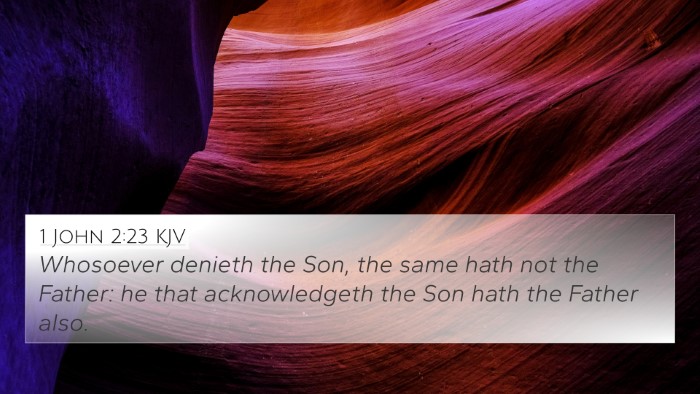Understanding 2 John 1:3
Bible Verse: 2 John 1:3 - "Grace, mercy, and peace will be with us, from God the Father, and from the Lord Jesus Christ, the Son of the Father, in truth and love."
Summary and Meaning
The verse 2 John 1:3 encapsulates the essential themes of grace, mercy, and peace as foundational aspects of the Christian faith. It highlights the relationship between God the Father and the Son, Jesus Christ, reiterating the necessity of truth and love in the life of believers.
Insights from Public Domain Commentaries
Matthew Henry's Commentary
Matthew Henry emphasizes that this greeting is not merely formalistic; it encapsulates the blessings that flow from God the Father and our Lord Jesus Christ. The mention of grace signifies unmerited favor, mercy indicates compassion and kindness, and peace alludes to spiritual tranquility that comes from a right relationship with God. Henry underscores that these gifts are received in conjunction with truth and love, which are essential qualities for believers.
Albert Barnes' Notes on the Bible
Albert Barnes points out that the apostle John, in this epistle, wishes grace, mercy, and peace, indicating that these divine attributes are essential for the Christian experience. He notes that the source of these blessings is both God the Father and Jesus Christ, affirming the unity of the two. Barnes further explains that truth and love are not merely virtues; they are foundational to Christian living and understanding one's relationship with God and others.
Adam Clarke's Commentary
Adam Clarke elaborates that grace, mercy, and peace are not only desirable but necessary for believers as they navigate the trials of life. He remarks that this verse affirms the duality of Christ’s nature as both divine and human. Clarke highlights that God's favor (grace), compassion (mercy), and the serenity (peace) that flows from them can only be appropriated through a life anchored in truth and expressing love toward others.
Bible Cross-References
- Romans 1:7: "To all that be in Rome, beloved of God, called to be saints: Grace to you and peace from God our Father, and the Lord Jesus Christ."
- Ephesians 1:2: "Grace be to you, and peace, from God our Father, and from the Lord Jesus Christ."
- Philippians 1:2: "Grace be unto you, and peace, from God our Father, and from the Lord Jesus Christ."
- 1 Peter 1:2: "Elect according to the foreknowledge of God the Father, through sanctification of the Spirit, unto obedience and sprinkling of the blood of Jesus Christ: Grace unto you, and peace, be multiplied."
- Colossians 1:2: "To the saints and faithful brethren in Christ which are at Colosse: Grace be unto you, and peace, from God our Father and the Lord Jesus Christ."
- Titus 1:4: "To Titus, mine own son after the common faith: Grace, mercy, and peace, from God the Father and the Lord Jesus Christ our Saviour."
- 2 Corinthians 1:2: "Grace be to you and peace from God our Father, and from the Lord Jesus Christ."
Thematic Connections
This verse emphasizes the core aspects of Christian theology regarding God's relationship with humanity through Christ. It connects to broader themes such as:
- The unmerited favor of God (grace) towards His creation.
- The outpouring of divine compassion (mercy) that reflects God's character.
- The inner peace that comes from knowing Christ and living in accordance with God’s truth.
Inter-Biblical Dialogue: Links and comparisons can be drawn between this verse and other scripture that discusses grace, mercy, and love, emphasizing an integrated understanding of Christian doctrine.
Application in Christian Life
Understanding this verse calls Christians to reflect on how grace, mercy, and peace manifest in their lives. It encourages believers to strive for a heart of truth and love, fostering relationships that mirror the divine relationship between the Father and the Son.
Conclusion
2 John 1:3 serves as a profound reminder of the blessings that God extends to His followers and the essential attitudes of truth and love that should characterize their lives. It connects deeply with other scriptural passages, emphasizing the importance of grace, mercy, and peace in the believer's journey.
By engaging with cross-references and themes within the scriptures, believers can deepen their understanding of God's Word and cultivate a more profound faith.











